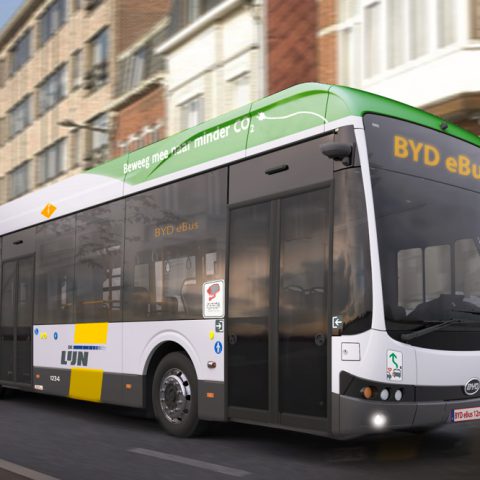De Lijn has ordered 92 BYD electric buses (part of a framework agreement for up to 500 units)
The board of De Lijn, the public transport authority and operator in Flanders, Belgium, has approved the putchase of 92 standard (12 m) electric buses from BYD Europe. Deliveries are set to begin in early 2025. The order represents an investment of more than 43 million euro. “This order confirms that De Lijn is firmly on […]

The board of De Lijn, the public transport authority and operator in Flanders, Belgium, has approved the putchase of 92 standard (12 m) electric buses from BYD Europe. Deliveries are set to begin in early 2025.
The order represents an investment of more than 43 million euro.
“This order confirms that De Lijn is firmly on track with the electrification of its fleet,” says director-general Ann Schoubs. “Our target is to offer our clients fully emission-free public transport by 2035.”
In order to reach that target, De Lijn needs to replace its entire bus fleet and to electrify some 50 depots.
92 BYD electric buses for De Lijn
This order of 92 standard e-buses (length: 12 m) follows the awarding by De Lijn’s board of a new framework agreement consisting of a maximum of 500 12 m e-buses to BYD Europe.
De Lijn states that they “will decide at a later stage which framework agreement(s) it will continue ordering from. The Flemish operator may order on the 2021 framework agreement, that was awarded to Van Hool and VDL, and/or on this new framework agreement”.
“Manufactured in Komarom, Hungary, these electric buses will be delivered from early 2025 onwards,” says De Lijn director-general Ann Schoubs. “They will include our typical customer-friendly equipment, such as USB charging points, an electric ramp for less mobile clients, extra wide information screens on board, LED lighting and seats with recycled leather. Our drivers’ safety and comfort is also being taken care of.”
“This order of 992 electric buses is excellent news for De Lijn’s customers and for the environment and climate,” says Flemish minister for Mobility and Public Works Lydia Peeters. “In practice, this means that De Lijn will be replacing old generation diesel buses with emission-free buses. We are pleased that De Lijn has succeeded in utilising all investment resources for fleet renewal that were made available by the Flemish government for 2023.”







